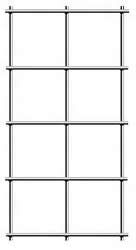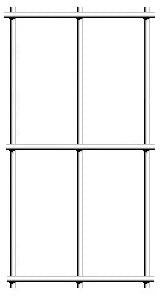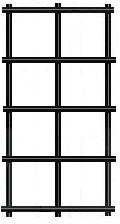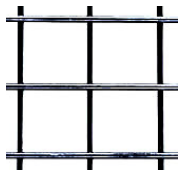Louis Page isn’t just here to sell great fencing. We’re also here to help you learn about and understand your fencing options, so that you get the very best fence products for your needs every time.
A fence is an important investment, and if you’re not a professional, selecting the best solution for your needs might seem daunting at first. Don’t worry, we’ve broken it down into to a few key considerations for you.
4 Keys To Choose the Best Fence for Your Needs:
1. Wire Type
Determines durability and use.
For example, vinyl-coated and stainless steel fences offer maximum durability, making them ideal choices for harsh environments and applications where longevity is a must.
2. Wire Gauge
Determines durability and use.
Determines durability and use. The lower the gauge number the thicker the wire, making low gauge fencing ideal for applications where strength and durability are required.
3. Mesh Opening
Determines Durability and use.
Smaller mesh opening is important for fencing in or out smaller animals, which could slip through a larger opening. Smaller openings also make for more rigid panels, making durability a secondary consideration.
4. Fence Height
Determines Use.
Quite simply, taller fencing is required to fence in and out larger animals, and animals that can jump high.

1. Wire Type
Louis Page provides four unique types of welded wire to address any durability and budget needs.

Galvanized Before Weld (GBW)
GBW mesh is made from strands of galvanized wire welded together. During the welding process, the rust preventing galvanizing is burned off at the weld points where the wires intersect. These meshes are economical but have a limited lifetime. A general purpose mesh, ideal for low-cost fencing, kennels, cages, and a variety of other uses.

Galvanized After Weld (GAW)
GAW mesh is made by dipping previously welded mesh into a bath of molten zinc. The entire mesh, including the welded areas, is thoroughly sealed and protected against rust. This wire is particularly useful for animal enclosures or other applications where rust prevention and long life is desired. Ideally suited for use as ground wire for bird enclosures and animal enclosures. (ZA (zinc aluminum for ag fences (one step between GAW & Vinyl Coated).

Vinyl Coated (VC)
VC mesh is made by coating either galvanized before or galvanized after welded mesh with a thick layer of black or green PVC fused to the wire by a heat process, creating an attractive, tough, long-lasting, weather and chemical-resistant mesh. Vinyl coated meshes have the longest lifetime in any application. The 1-1/2"x1-1/2", 12-1/2" gauge mesh makes a particularly excellent floor for dog kennels.

Stainless Steel
SS welded wire mesh, strong and long lasting, needs no additional finish to protect it. The wire itself is extremely resistant to rust, corrosion and harsh chemicals. Use stainless mesh or fence in areas with prolonged exposure to salt and other corrosives.
2. Wire Gauge
Along with Wire Type, Wire Gauge will determine how durable and long-lasting your fence will be. Louis Page sells welded wire in 11, 12.5, 14, 16, 19, 23 and 27 gauge thicknesses.

Thicker wire is more durable in the elements AND tougher for critters to chew through. A sharp beak can make short work of a thin gauge wire. No such luck with a thicker gauge!
For these reasons, Wire Gauge is an important factor in determining both how long your fence will last and what use it is best suited to.

Example of 12.5 Gauge Welded Wire
3. Mesh Opening
Mesh opening is a very important factor to consider based on what you’re planning to fence in or out.
Durability is also a secondary consideration with mesh opening, as smaller meshes create more rigid, durable fencing.

Example of Wired Mesh
4. Fence Height
Fence Height is another very important factor based on what you’re planning to fence in or out.
For example shorter fences are ideal for uses like chicken enclousures, rabbit cages and puppy kennels. Taller fence is required for enclosing large farm animals like cows and goats, and fencing out deer.
Taller fence is also required when safety and security of people is the goal, as in pool fence and fences at places like construction sites and zoos and public parks.

Example of Fence Height






